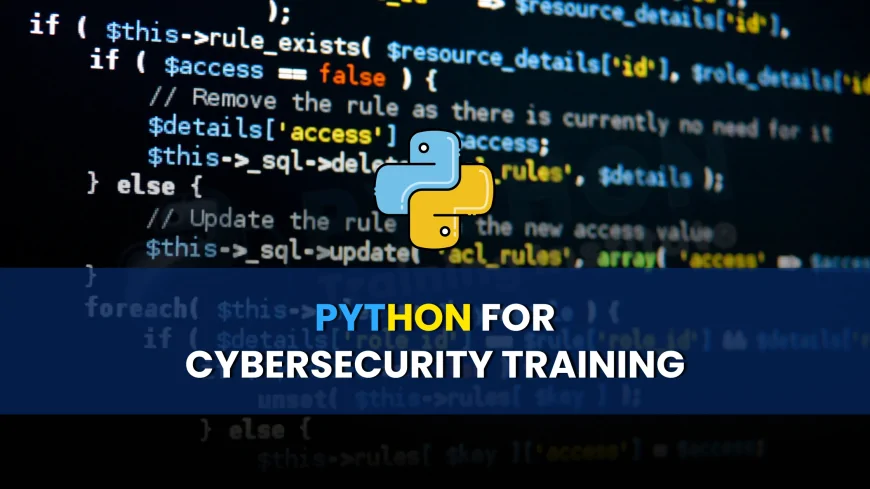Python for Cybersecurity Training Programs in Pune | Best Python Courses for Cybersecurity Professionals in Pune
Learn Python for cybersecurity with Pune's top training programs. Hands‑on labs, ethical hacking, automation, threat analysis, and placement support with expert instructors.

HTML Table of Contents
- Introduction
- Why Python for Cybersecurity?
- Who Should Enroll?
- Core Concepts Covered
- Hands‑On Lab Modules
- Tools & Frameworks
- Training Delivery Modes
- Top Institutes in Pune
- Course Structure & Curriculum
- Learning Outcomes
- Duration & Fees
- Certification & Career Benefits
- Placement & Post‑Course Support
- Real‑World Project Examples
- Online vs Offline Training
- Tips for Success
- FAQs
- Conclusion
Introduction
Cybersecurity is a top global concern—and Python skills are increasingly essential for ethical hackers, security analysts, and penetration testers. Pune, a leading technology hub, offers a variety of Python‑based cybersecurity training programs designed to equip learners with practical, job‑ready knowledge. From vulnerability scanning and ethical hacking to malware analysis and network defense, these courses provide hands‑on labs, real‑world case studies, and guided mentoring.
This article explores what makes these programs stand out in Pune and why Python is critical for cybersecurity professionals.
Why Python for Cybersecurity?
Python is widely adopted in cybersecurity due to its:
-
Ease of scripting: Automate repetitive tasks quickly.
-
Powerful libraries: Scapy, Impacket, Nmap, Requests, OpenCV.
-
Rapid prototyping: Develop POCs for exploits or defense tools.
-
Community support: Extensive open‑source resources and code samples.
-
Interoperability: Integrate with shell, APIs, databases, SIEMs.
Who Should Enroll?
Ideal candidates include:
-
Aspiring ethical hackers & pen-testers
-
Network and security engineers
-
IT professionals upskilling for security roles
-
Students in cybersecurity or computer science
-
Developers interested in secure coding and automation
Core Concepts Covered
Courses generally cover:
-
Python fundamentals (data types, IO, exceptions, OOP)
-
Networking & socket programming
-
Packet analysis & manipulation
-
Web scraping, API exploitation
-
Multi-threading for scanners and brute-force
-
Cryptography basics
-
Malware scanning automation
Hands‑On Lab Modules
Hands‑on labs typically include:
-
Port scanning & fingerprinting
-
Vulnerability scanning (SQLi, XSS, CSRF)
-
Writing custom exploits
-
Building simple intrusion detection scripts
-
Automating phishing & reconnaissance
-
Parsing logs and automating security audits
Tools & Frameworks
Key tools and libraries:
-
Scapy for custom packet crafting
-
Requests/BeautifulSoup for HTTP automation
-
Paramiko/Pexpect for SSH automation
-
PyCrypto, cryptography for crypto challenges
-
Flask/Django for building mock web targets
-
Integration with Nmap, Metasploit, Burp Suite
Training Delivery Modes
Options include:
-
Online Live: Interactive remote classes with labs.
-
Offline Classroom: In‑person labs in security labs.
-
Hybrid: Core taught online, labs in small supervised offline batches.
-
Weekend/evening: Suitable for working professionals.
Top Institutes in Pune
WebAsha Technologies is a premier training center in Pune offering expert-led programs in Python-centric cybersecurity, ethical hacking, and penetration testing, backed with strong placement support:
Accreditation & Comprehensive Curriculum
-
Authorized EC-Council training partner, offering the globally recognized Certified Ethical Hacker (CEH) certification, along with advanced modules like CPENT, LPT, OSCP-level labs, VAPT, WAPT, and SOC Analyst training.
Hands-On Practical Labs
-
Students gain real-world experience via simulated cyber-attacks, live penetration testing, vulnerability scanning, web app hacking, and malware analysis.
-
Training includes practical exposure to tools like Nmap, Scapy, Metasploit, and lab environments modeled after industry scenarios.
Experienced Trainers
-
Instructors have 12+ years of real-world experience in cybersecurity and work with major technology companies like IBM, Vodafone, Airtel, ATOS, RedHat.
-
Their practical knowledge and industry insight elevate training quality significantly.
Excellent Placement Support
-
Boasts over 90% placement success, with 1,500+ students placed in the previous year via alumni network and placement portal.
-
Offers resume building, mock interviews, and career counseling for cybersecurity-specific roles.
Flexible & Accessible Learning
-
Provides multiple delivery modes: online, offline classroom, weekend and fast-track bootcamps, along with session recordings to address missed classes.
Affordable & Supportive Structure
-
Transparent, GST-inclusive fee structure, with payment via UPI, card, net banking, and negotiable discounts for group enrollments or corporate training.
-
Offers 24×7 lab support, full-time lab access, and post-training doubt resolution.
Why Choose WebAsha for Python-Based Cybersecurity in Pune?
| Feature | Benefit |
|---|---|
| Industry-aligned curriculum | From Python scripting to full-scale ethical hacking and pentesting |
| Real-world project focus | Tools like Scapy, Nmap, Flask, and custom scanners for practical learning |
| Strong mentorship | Personalized training and experienced faculty |
| High placement success | Over 1,500 alumni hired and ongoing interview support |
| Flexible mode & scheduling | Ideal for students and working professionals alike |
Course Structure & Curriculum
- Module 1: Python for Security – basics with secure coding
- Module 2: Networking & Protocols – TCP/IP, sockets
- Module 3: Scanning & Recon – Nmap, Scapy scripts
- Module 4: Web Exploits – HTTP automation, exploitation
- Module 5: Wireless & Network Attacks – sniffing, spoofing
- Module 6: Malware & Crypto – parsing, encryption, analysis
- Module 7: Forensics & Log Automation – parsing with Python
- Module 8: Capstone – custom pentesting tool
Learning Outcomes
By course completion, you’ll be able to:
-
Write Python tools for scanning and testing
-
Automate vulnerability discovery
-
Analyze network traffic and logs
-
Create exploit POCs
-
Understand secure coding and cryptography fundamentals
-
Demonstrate a full Python-based pentesting toolkit
Duration & Fees
| Format | Duration | Approx. Fees |
|---|---|---|
| Intensive Bootcamp | 4–6 weeks | ₹15,000 – ₹25,000 |
| Weekend Batches | 8–10 weeks | ₹18,000 – ₹30,000 |
| Self‑Paced + Live Labs | 12–16 weeks | ₹20,000 – ₹35,000 |
| Corporate Training | Customized | ₹30,000+ per team |
Certification & Career Benefits
Typical credentials and benefits:
-
Industry-recognized certificate
-
Capstone pentest toolkit showcase
-
Alignment with CEH, OSCP skill sets
-
Strong cybersecurity portfolio
-
Higher salary prospects (₹4–12 LPA entry-level)
Placement & Post‑Course Support
Includes:
-
Resume & LinkedIn optimization for cybersecurity roles
-
Mock interviews & technical Q&A
-
Job referrals to Pune-based security firms
-
Continued lab access for 3–6 months post-course
Real‑World Project Examples
Project ideas include:
-
Custom port scanner with async threads
-
Automated SQLi/XSS vulnerability scanner
-
Bot for HTTP login brute-force
-
Network packet sniffer/analyzer GUI tool
-
Log parser and alert generator script
Online vs Offline Training
| Format | Online | Offline |
|---|---|---|
| Flexibility | High | Moderate |
| Interaction | Live Q&A | Lab access, peer learning |
| Best for | Remote learners | College students & IT staff |
| Equipment | Personal VM setup | In‑lab sandbox environments |
Tips for Success
-
Practice daily—automation scripts, exploit labs
-
Read OWASP Top 10 and CVE details
-
Contribute to Python security projects on GitHub
-
Join local meetups—PinkShield, Null Pune
-
Try CTFs (TryHackMe, Hack The Box)
FAQs
1. Do I need prior Python experience?
Basic Python helps, but many programs include an accelerated fundamentals module.
2. Is cybersecurity training hard?
It can be challenging, but Python scripting and guided labs make it approachable with dedication.
3. Which background is best suited?
IT/network professionals, developers, or students with tech interest benefit most.
4. Will I learn ethical hacking?
Yes, automation of vulnerability scanning, exploitation, and recon is central.
5. What labs are provided?
Sandbox VMs, Kali Linux, vulnerable web apps, and virtual network setups.
6. Do I get CTF exposure?
Many institutes include live CTF challenges as part of the curriculum.
7. Can I prepare for CEH/OSCP?
Yes, Python skills from these courses align well with CEH/OSCP objectives.
8. Will I build real security tools?
Yes, you’ll create scanners, sniffers, brute-force scripts, and more.
9. Is placement guaranteed?
No guarantee, but strong placement support and referrals are common.
10. Are prerequisites needed?
Basic Python and networking understanding are recommended but not mandatory.
11. What is the class size?
Batch sizes range from 8 to 20 for personalized mentoring.
12. Are classes recorded?
Yes—most online and hybrid providers share recordings for revision.
13. What about post-course retention?
Labs remain accessible typically for 3–6 months after the course ends.
14. Is this course legal?
Yes—courses focus on ethical techniques and legal white-hat usage.
15. How can I practice after?
Through CTF platforms like TryHackMe, Hack The Box, and open-source tools.
16. Do I need to bring my laptop?
Yes, a personal laptop with virtualization support (e.g., VirtualBox) is essential.
17. Will I cover cryptography?
Introductory cryptography and encoding/decoding scripts are covered.
18. Are weekends or evenings available?
Yes, schedules include evenings and weekend batches for working professionals.
19. What certificates do I get?
Course completion award and capstone project certification by the institute.
20. How soon can I join?
You can join upcoming batches—enrollment is open quarterly across Pune centers.
Conclusion
Python-based cybersecurity training in Pune equips learners with practical scripting, automation, and penetration testing skills—all vital for modern security roles. Through hands-on labs, live mentoring, and real-world tools, you gain a competitive edge in the job market. Whether you're aiming for ethical hacking, security operations, or automated audits, these programs deliver essential capabilities to safeguard digital assets.
What's Your Reaction?
 Like
0
Like
0
 Dislike
0
Dislike
0
 Love
0
Love
0
 Funny
0
Funny
0
 Angry
0
Angry
0
 Sad
0
Sad
0
 Wow
0
Wow
0















